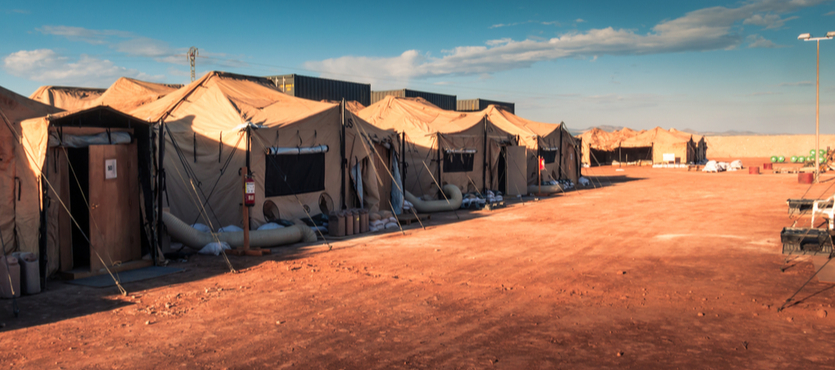A real estate management company is taking heat over alleged “appalling housing conditions and cavalier treatment” at one of the world’s largest military installations.
Specifically, Corvias and Meade Communities ignored problems like mold in the walls, according to court documents. Firms like these provide over 99%t of military personnel housing, because a 1996 law encouraged privatization. Like many other providers, C&M has a 50-year lease. The company has earned roughly $1 billion in fees.
The lawsuit highlights the plight of the Nunez family. Allegedly, the 18-year veteran and his family dealt with “excessive moisture, mold, and standing sewage water” for about four years. C&M consistently denied repair and maintenance requests, according to the lawsuit.
In a related story, officials at a joint Army-Air Force base in San Antonio uncovered similar issues in about 10% of private base housing units. In response, landlords Hunt and Lincoln say they have spent millions of dollars upgrading Randolph housing. Nevertheless, several families have filed a lawsuit against these companies.
“We take the responsibility of serving those who serve and sacrifice so much for our country extremely seriously and will continue to make improvements to offer every resident high-quality housing,” Hunt said in a statement.
Contractors and Logistics
Overseas contractors need housing, too. They need other logistical support, as well. Contractors do almost all these things, especially in remote overseas locations.
Since World War I, the tooth-to-tail ratio (T3T) has been quite high, or quite low, depending on your perspective. When the Doughboys arrived in France in 1917, the British and French had already been fighting for three years. So, most logistical needs, like troop housing, were already taken care of. But that was not true in any subsequent 20th century wars. That certainly is not true in the 21st century War on Terror. This conflict takes American servicemembers to hostile and remote corners of the world.
Logistical support is critical for troops in the field. The stronger the tail is, the sharper the teeth are. Some areas include:
- Vehicle and equipment maintenance,
- Housing construction,
- Meal preparation,
- Laundry service,
- Medical care,
- Technological infrastructure,
- Base security,
- Housing maintenance, and
- Recreation/morale.
Overseas contractors typically provide most or all these services. Extended KP duty is usually very bad for troop morale, and most soldiers do not want to be MPs.
Additionally, contractors have the skills needed to fill these roles. Contractor cooks are professional chefs, contractor maintenance personnel are professional mechanics, and so on.
Contractors and Occupational Diseases
In the War on Terror, logistical contractors risk trauma injury. Militants can strike in any place at any time and with almost any weapon. Occupational disease, however, may be a more significant risk. These conditions occur slowly over time. Additionally, since they often involve pre-existing conditions, occupational disease compensation claims are legally complex. Some common overseas contractor occupational diseases include:
- Hearing Loss: Even if logistical contractors never leave the base area, the noise of battle is everywhere. Combat contractors sharpen their skills on the firing range, helicopters take off and land, large construction machinery rumbles, and so on. Prolonged exposure to sounds as low as 80 decibels, which is basically a school cafeteria, can lead to permanent hearing loss.
- DRLD: Deployment Related Lung Disease is an umbrella term for a number of respiratory conditions related to deployment in Iraq and Afghanistan. Until they were banned, burn pits were a serious hazard in these places.
- Carpal Tunnel Syndrome: This condition often plagues contractors who must work for long hours in cramped offices. Continual wrist elevation from typing compresses the carpal tunnel, causing extremely painful pinched nerves.
- Joint Pain: Many logistical contractors do lots of loading and unloading. The more remote the place, the more this activity increases. It does not take too much lifting to cause a back or knee injury, especially if the contractor has a pre-existing condition.
Frequently, these conditions creep up on contractors so slowly that they miss the Defense Base Act claims deadline. More on that below.
Compensation Available
The aforementioned claims deadline is usually10 days after the onset of illness or injury. But most people do not run to base physicians the first time they cannot hear the TV as well.
Generally, a variation of the delayed discovery rule protects victims in these cases. Most injured victims do not have a duty to report their conditions until:
- They know the full extent of their injuries and
- They connect those injuries to a workplace condition.
So, even if the hearing loss, joint pain, or other condition is in an advanced stage, full compensation is usually available.
Thanks to the eggshell skull rule, full compensation is generally available if the victim had a pre-existing condition. Usually, insurance companies cannot use a non-work illness or injury as an excuse to reduce or deny benefits. Full compensation is usually available if the occupational disease made the pre-existing condition worse, as opposed to the other way around. To make this showing, our attorneys usually partner with medical experts in contested cases.
Procedurally, most Defense Base Act claims settle out of court. Sometimes, settlement takes place at a pretrial conference. A mediator reviews the file and medical record. Then, the mediator tries to facilitate a settlement between the victim and insurance company.
Some claims settle at this point. But many more proceed to the next level, which is an administrative hearing. An administrative law judge presides over this hearing. Since attorneys can present evidence, challenge evidence, and make legal arguments, victims have a good chance to obtain fair compensation.
Insurance company lawyers know that victims have an edge in these hearings. So, many claims settle immediately prior to this hearing. An attorney simply needs to be ready to go the distance.
Contact Barnett, Lerner, Karsen, Frankel & Castro, P.A. to learn more about DBA benefits.

